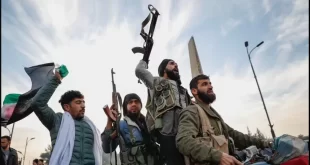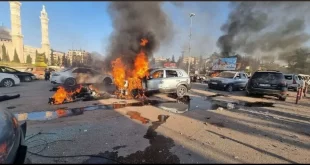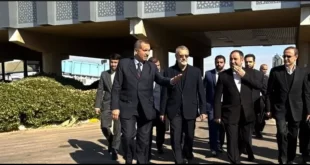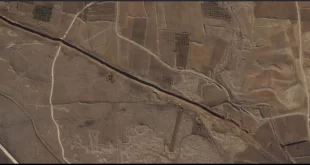
May 4, 2014, the Independent
It is only a matter of time before jihadis in al-Qa’ida-type groups that have taken over much of eastern Syria and western Iraq have a violent impact on the world outside these two countries. The road is open wide to new attacks along the lines of 9/11 and 7/7, and it may be too late to close it.
Those who doubt that these are the jihadis’ long-term intentions should have a look at a chilling but fascinating video posted recently by the Islamic State of Iraq and the Levant (Isis), formerly al-Qa’ida in Iraq. It shows a group of foreign fighters burning their passports to emphasise their permanent commitment to jihad. Many of the passports thrown into the flames have grass-green covers and are Saudi; others are dark blue and must be Jordanian. Some of the fighters show their faces while others are masked. As each one destroys his passport, sometimes tearing it in half before throwing it into the fire, he makes a declaration of faith and a promise to fight against the ruler of the country from which he comes.
A Canadian makes a short speech in English before switching to Arabic, saying: “It is a message to Canada, to all American powers. We are coming and we will destroy you.” A Jordanian says: “I say to the tyrant of Jordan: we are the descendants of Abu Musab al-Zarqawi [the Jordanian founder of al-Qa’ida in Iraq killed by US aircraft in 2006] and we are coming to kill you.” A Saudi, an Egyptian and a Chechen make similar threats.
The film is professionally made, and was probably shot somewhere in northern or eastern Syria. It is worth looking at carefully, and keeping in mind that these are not an isolated band hiding in desert wastes or mountain caves. Isis and Jabhat al-Nusra, the official affiliate of al-Qa’ida, now control, or can easily operate in, a great swathe of territory from the Tigris to the Mediterranean, and from the Jordanian border to southern Turkey.
Threats, such as those made by the group burning their passports, are creating something near panic among Iraq’s neighbours, who were slow to take on board last year that Syrian armed opposition had come to be dominated by al-Qa’ida or its clones. A report by the International Crisis Group (ICG), “The Rising Cost of Turkey’s Syrian Quagmire”, published last week, cites a Turkish official saying: “The armed al-Qa’ida element will be a problem for the Turks. As a secular country, we do not fit with their ideology. What happens if they can’t get what they want in Syria? They will blame Turkey and attack it.” Bear in mind that the thousands of foreign jihadis who have poured into Syria and Iraq mostly got there by crossing the 510-mile-long Turkish-Syrian border. The head of an influential Turkish think tank is quoted by ICG as saying that “When Turkey starts arresting them [jihadis], which it will do, we know what will happen. There will be bombs all over Turkey.”
Jordan is also showing signs of extreme nervousness over support being given to the Syrian armed opposition, just across its border in southern Syria. American, Saudi and Jordanian intelligence have been working on creating a “southern front” around Daraa, the southern city where the Syrian revolt began, a front supposedly made up of moderate, secular fighters, who are both anti-Assad and anti-jihadi. This is deceptive, since an important force in such operations would be Jabhat al-Nusra which, on this front, is reportedly acting in coordination with a Jordanian, Saudi and US intelligence joint operations room in Amman.
But the Jordanians have got cold feet over the idea of a southern offensive launched from their territory. They are no longer as confident as they were in 2011 and 2012 that President Assad is bound to lose. They worry about an estimated 2,000 Jordanian jihadis in Syria, and what happens when they return to Jordan. There was a mysterious Jordanian airforce attack destroying vehicles entering Jordan from Syria on 16 April in which the Syrian government denied any involvement. The Jordanians also forbade an opposition offensive at Daraa timed to coincide with a rebel assault in Aleppo.
Even the US State Department’s annual report on terrorism, issued last week, has noted that al-Qa’ida-type groups are getting stronger. Its image of al-Qa’ida in the past has been along the lines of a bureaucratic entity somewhat similar to the State Department itself. It therefore takes heart from the belief that because of organisational and leadership losses “AQ’s core leadership has been degraded, limiting its ability to conduct attacks.” The word “core” is useful here since it can mean either “a central command” or simply “at the centre of”. In practice, al-Qa’ida since 2001 has primarily been an ideology and a method of operating, not a cohesive organisation. The State Department has finally noted this, speaking of “the rise of increasingly aggressive and autonomous AQ affiliates and like-minded groups”.
In reality, the situation is worse than the State Department admits, since over the last year Isis has taken over much of Sunni Iraq. It levies taxes in cities such as Mosul and Tikrit and has substantial control in Fallujah and along the Euphrates valley, through western Iraq and eastern Syria up to the Turkish border. It has captured the Fallujah dam on the Euphrates, and can flood or deny water to areas further south; at Baiji on the Tigris, north of Baghdad, it has blown up an oil pipeline, polluting the river which had been used, after treatment, to supply drinking water to Baghdad. On the western outskirts of Baghdad at Abu Ghraib, Isis has held a military parade and the famous prison was hastily evacuated. A comforting theory explaining the surge in Isis’s strength in Iraq is that Prime Minister Nouri al-Maliki exaggerated its power to frighten Shia voters before last Wednesday’s parliamentary election. He thereby diverted attention from his administration’s appalling record of corruption and incompetence by focusing on the danger of a Sunni counter-revolution. The outcome of the election will show if this strategy had worked.
Unfortunately, all the signs are that the political and military incapacity of the Iraqi government is all too real. Its armed forces are said in Baghdad to have suffered 5,000 casualties including 1,000 dead in fighting in Anbar province in the last four months. Whole battalions are reported to have melted away because the men were not being paid, or they have not received supplies of food and ammunition. According to one report, even the job of army divisional commander can be bought for $1m with the assumption that whoever takes the job can show a profit by making $50,000 a month through protection money and levies on vehicles passing checkpoints.
After the election the government may try to repeat the US strategy of successfully using the Sunni tribes against al-Qa’ida groups such as Isis. The difficulty is that for the moment Sunni communities hate the Iraqi army and security forces more than they do al-Qa’ida.
 Syria Support Movement solidarity with the Syrian people
Syria Support Movement solidarity with the Syrian people




